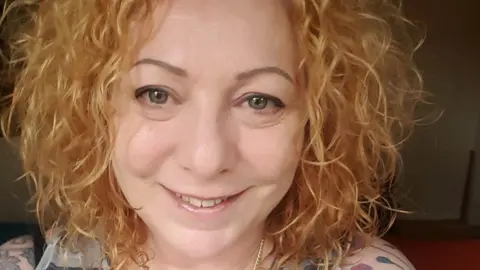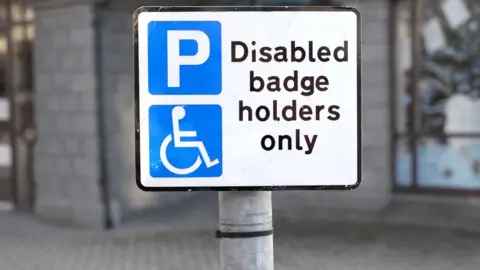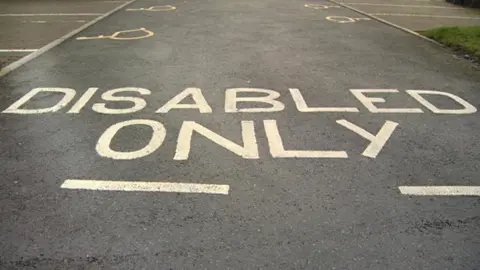Blue badge permits: Shake-up 'will increase parking demand'
 Getty Images
Getty ImagesCouncils must make sure there are enough disabled parking spaces to cope with the extra demand a blue badge scheme expansion will bring, the charity Scope has said.
As of Friday, people with hidden disabilities in England are now also eligible to apply for blue badges.
Scope welcomed the move but said if spaces are scarce, the badges "are not worth the paper they're printed on".
The Local Government Association said councils regularly review parking.
Currently, about 2.35 million people with physical disabilities in England have a blue badge.
Blue badge holders are allowed to park in spaces which might be restricted to other drivers, for example parking on yellow lines for up to three hours, for free in pay and display bays, or in spaces designated "disabled".
Under Friday's change - which is the biggest shake-up of the blue badge scheme since it was introduced nearly 50 years ago - people with hidden disabilities, such as dementia, autism or anxiety disorders will also be eligible to apply for the permits.
However, not everyone with hidden disabilities will qualify for a badge, as it will still be up to local councils to decide if an applicant meets the eligibility criteria.
'Life-changing'
The change has been widely welcomed by charities, including the head of the National Autistic Society, who called it a "huge relief".
"A blue badge can be life-changing," said Tim Nicholls, from the charity, who said many autistic people are often so anxious they may find it hard to leave the house.
Ceri Smith, policy and campaigns manager at Scope, also welcomed the move, saying it would make a "real difference" to disabled people with invisible impairments.
However she added: "But in order for it to work, it's vital that councils issue blue badges to people who are newly eligible to apply.
"More also needs to be done by councils to ensure that there are enough allocated blue badge spaces near shops and amenities to meet increasing demand."

'Not enough spaces... and mouthful of abuse'
 Sarah Tranter
Sarah TranterSarah Tranter, 52, from Stourport-on-Severn, has had fibromyalgia - a long-term condition that causes pain all over the body - since 2008. She got her first blue badge five years ago after she was diagnosed with breast cancer.
She says she has mobility issues and cannot walk far, while her son has autism which causes "debilitating" anxiety.
"It is very difficult to get a blue badge, so anyone lucky enough to have one absolutely needs and deserves one," she says.
"There aren't enough spaces, however; that is something that really needs addressing.
"Even those that are available get taken up by non-blue badge holders... usually fit young men in my experience.
"If you say anything you get an aggressive mouthful of abuse."
Meanwhile, blue badge holder Rebecca, from Oxfordshire, says the change is important and positive, but adds she already finds it hard to find disabled spaces as they are often full.
"Ultimately the consequences of there not being enough spaces is that I sometimes have to park in regular spaces, which makes it challenging to get my wheelchair out of the car as there is not enough space," she says.

Earlier this week, Scope responded to figures from company Confused.com claiming many UK councils in charge of parking provisions have not planned to extend their number of blue badge spaces.
Ms Smith said: "With spaces already scarce, it's extremely worrying that so few councils have prepared for the expansion of the blue badge scheme, despite knowing it was coming for months.
"Councils need to up their game to ensure blue badge holders can actually use them."
 Getty Images
Getty ImagesCharity Disabled Motoring UK, which campaigns for disabled drivers and blue badge holders, warned the increase in demand "may undermine the entire scheme and render it not fit for purpose".
"The end result may mean it will let down the people it was originally intended to help as well as disabled people with hidden disabilities," it said in a statement.
"The charity predicts that when the number of blue badge holders increases from August 2019, we will be contacted more and more by disabled people who find their blue badge completely meaningless as they will be unable to find adequate parking because it will be so oversubscribed.
"We implore all local authorities and private parking operators to take this change seriously, review their disabled parking provision and stress the importance that they all enforce disabled parking properly so that disabled bays are kept free only for genuine blue badge holders."
'Not just councils'
Last year, 859,000 blue badge permits were issued in England, a decrease of 3.2% compared to the year before.
Earlier this year, Essex County Councillor John Spence said the new rules could lead to a 20% increase in the number of applications in Essex - putting further pressure on stretched disabled parking provision.
The Department of Transport, launching the expansion of the scheme on Friday, said councils will get £1.7m in the first year of the programme, to help with the expected spike in applications.
But it added that councils may need to review parking provision to increase the number of spaces available.

In a statement, the Local Government Association - which represents councils in England and Wales - said the availability of spaces for blue badge holders was not just down to councils as there was also "significant private provision of parking".
"Councils know that blue badges are a vital lifeline for disabled people which help them get out and about to visit shops or family and friends and many have already been approving badges for people with non-physical disabilities," the LGA said in a statement.
"Councils regularly review parking provision in their areas, including both public and private, in order to help meet the needs of the public, including those with blue badges.
"Overall provision will depend on private operators, council resources as well as competing demand for road space and public land."
